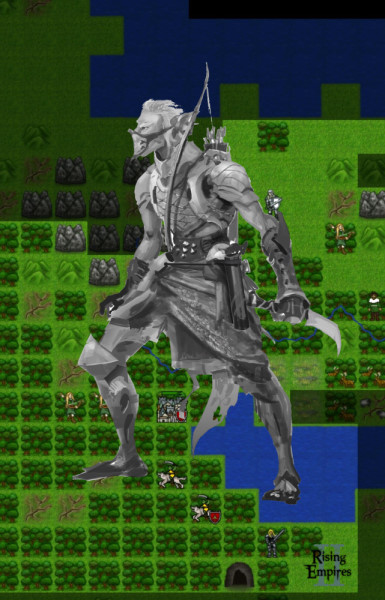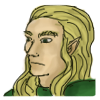
Elves
resemble humans. From a distance it’s impossible to distinguish between the two
races. But a closer look will reveal certain differences. Elves have a longer
and thinner body. They often reach a length above 2 meters (which is 20–30
centimeters longer than regular humans). Their ears are pointy and their eyes
have a feline touch. While humans vary from light pink to black skin colour elves
are always very light pink. Their hair is blonde and the general style is to
keep it long and flowing free in the wind. This differs some between different
elves cultures though.
Elves are
very agile and dexterous. They can move quickly as the fox and climb as swiftly
as the bear. Their sight is as good as the eagle and they see in darkness as
well as a cat. They are not strong. Their body is physically weak compared to
humans and this make them very unsuitable for hand to hand combat.
Elves are
perhaps the oldest of all the races. But they took a long time developing
enough to start a civilization of their own. Now, with the dawn of
civilizations they have become one of the races that develop the quickest.
Slow ageing
Ageing is near to non-existent among the elves. They age incredibly slowly and it is not unheard of elves that have lived for many hundreds of years. Theoretically an elf can live thousands of years and still look as a young man. The elves, like all races, very recently started to settle in towns and cities. This new life will most likely see many more elves reach very old ages.
Another aspect that increases their life-span is their immunity system. It’s very rare that an elf gets physically sick. Their bodies reject most viruses and diseases that can harm other races.
Their relationship to nature
Elves are creatures of the wild nature. Instead of shaping the world after their own mind they have let the world shape their mind. They try to become part of the nature, to live in it without changing or damaging it.
Their respect and near religious awe of the nature and of the animals living in it have made them welcomed guests, not intruders. Wild animals are drawn to elf settlements and enjoy the frequent elven songs. An elven settlement is a place where animals, elves and trees live together in harmony.
In all decisions an elf would consider the effect on nature and animals as an important part. This is also true when it comes to their relations to the other races.
Their relationship to the other races
Other races, especially humans and greenskins, have an attitude towards the nature and their surroundings that clash with the elven way of life. This disrespect of what is most precious to the elves often leads to disagreements and open conflict. Elves distrust both humans and greenskins. Their relationship to dwarves is often easier. Dwarves live below ground and are a rock people. Dwarves do no damage to the nature and this often leads to a strong friendship between the two people.
Their relationship with the Ende differs from that of the other races. Elves do not fear death. They live a long life and embrace the end when it comes. It is very rare that an elf becomes an Ende Noii. Elves do not fear the Ende like other races do. However, they loath the Ende anyway. The Ende steal souls and stop them from reaching the Kingdom of Death, and this is a terrible crime. Elves of all alignments, good or evil, hate the Ende and will do all in their power to fight them.
Preferred level: Surface
Major Strengths
- Elves are quick of mind as well as body. This gives their companies a lower initiative than the other races allowing them to dictate the scene of battle.
- Elves have adapted well to a life in the forests. Movement in forest, deep forest and forest caves for non-cavalry armies are faster than for the other races.
- “Love of bows” – No elf have ever travelled without his bow. All elf companies are equipped with bows and have a ranged combat value.
- Elves have a flexible mind and are naturally curious. This gives them an advantage in research of new ideas and gadgets.
- Elves excel as hunters and receive a large food bonus in forest, deep forest and forest cave sectors.
Major Weaknesses
- Elves are agile and quick but lack physical strength. Their superiority in ranged combat does not always make up for this weakness. As a result elf formations are often weak in close combat.
- Elves receive less food in all non-forest terrain sectors compared to the other races.

